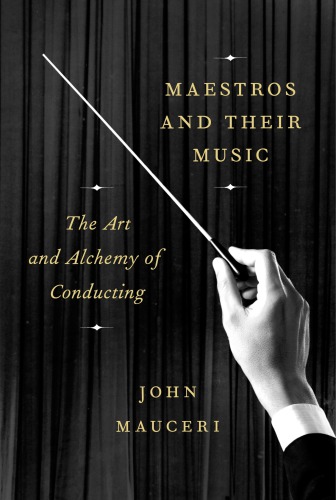
Maestros and Their Music
The Art and Alchemy of Conducting
کتاب های مرتبط
- اطلاعات
- نقد و بررسی
- دیدگاه کاربران
نقد و بررسی

July 1, 2017
American conductor Mauceri (The Genius of Film Music; Music for Alfred Hitchcock) delves into both the conductor's life and technical aspects of his profession in this informative and entertaining title. Having worked closely with musical luminaries of the 20th and 21st centuries including Leonard Bernstein and Leopold Stokowski, he has an insider's grasp of the vagaries of the music business, and presents conducting specifics with a minimum of jargon. We travel with the author as he grows from a student at Yale and Tanglewood to becoming the leader of the American Symphony and Hollywood Bowl Orchestras and frequent guest at the Metropolitan Opera. His travails in far-flung outposts here and abroad are related with equanimity and humor. Given the outsize egos of artists he encounters, there are a few shown in unflattering lights, but the maestro does not dwell on gossip. Especially useful are delineation of the rehearsal process and the specifics of how recordings are made. He cites Carl Bamberger's classic text Conductor's Art, to which this new title will be a worthwhile complement. VERDICT Mauceri's book will appeal to both musicians and others seeking a broad base of information about conducting and conductors.--Barry Zaslow, Miami Univ. Libs., Oxford, OH
Copyright 2017 Library Journal, LLC Used with permission.

August 28, 2017
Mauceri, music director of Pittsburgh Opera, draws on his 50-year experience conducting classical and popular repertoires with orchestras around the world for this combination history and guide that demystifies the secrets of the baton for a new generation of aspiring conductors. The first half of the book establishes the rules of the art; the second half elaborates on its vagaries and exceptions. Taking into consideration score, interpretation, time, place, and technology, Mauceri explains that “there is no single controlling element, only a kind of ecstatic, vibrating state in which conductivity is everywhere.” The narrative is at times heavy with technical detail, and occasionally with score settling, but Mauceri is strongest when he explores how music moves conductors, for example Carlo Maria Giulini’s gesture of “abject humility” while discussing the Catholicism in Schubert’s Symphony no. 8. Tales of Jean-Baptiste Lully’s death from gangrene caused by self-inflicted baton wounds and Arturo Toscanini tossing his handkerchief in the air to demonstrate how lightly the orchestra should play are moving and memorable. Leonard Bernstein, Mauceri’s mentor, and his music, which the author translates, figure large here too. Above all, Mauceri demonstrates what it’s like to work closely with brilliant conductors, bringing their artistry to life.

October 15, 2017
In this zealous memoir, conductor Mauceri, whose decades-long career spans from opera to symphony to Broadway (he is perhaps best known as Leonard Bernstein's preferred collaborator), describes his lifelong passion for conducting. With descriptions of conducting styles, the evolution of notation, and the differences between Western and Eastern music, as well as more gossipy bits, like difficult orchestra relationships, reactionary symphony boards, and hated critics, the book roves freely from technical musical matters to memory. At times self-important, yet at others self-deprecating, Mauceri is most intent on describing the esoteric and paradoxical qualities of being a maestro: giving decisive direction while allowing musicians freedom, making a classic piece new while staying true to the composer's intent, communicating to the orchestra how a passage should feel and sounda difficult task indeed, though he returns to these themes somewhat repetitively. All in all, symphony-lovers will be thrilled with the behind-the-scenes details, and aspiring conductors will enjoy the rich industry insight. Those simply curious about how classical music happens will feel drawn in by Mauceri's palpable passion.(Reprinted with permission of Booklist, copyright 2017, American Library Association.)

























دیدگاه کاربران